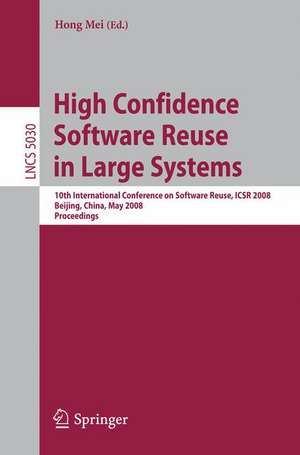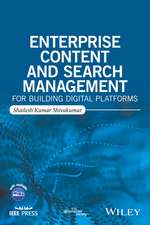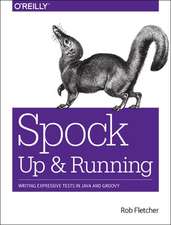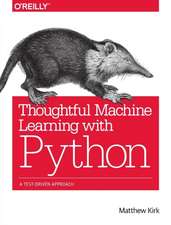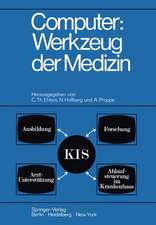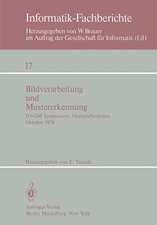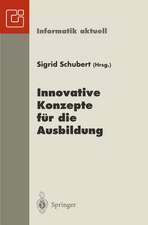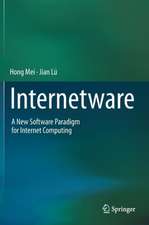High Confidence Software Reuse in Large Systems: 10th International Conference on Software Reuse, ICSR 2008, Bejing, China, May 25-29, 2008: Lecture Notes in Computer Science, cartea 5030
Editat de Hong Meien Limba Engleză Paperback – 8 mai 2008
Din seria Lecture Notes in Computer Science
- 20%
 Preț: 1061.55 lei
Preț: 1061.55 lei - 20%
 Preț: 307.71 lei
Preț: 307.71 lei - 20%
 Preț: 438.69 lei
Preț: 438.69 lei - 20%
 Preț: 645.28 lei
Preț: 645.28 lei -
 Preț: 410.88 lei
Preț: 410.88 lei - 15%
 Preț: 580.46 lei
Preț: 580.46 lei - 17%
 Preț: 427.22 lei
Preț: 427.22 lei - 20%
 Preț: 596.46 lei
Preț: 596.46 lei -
 Preț: 381.21 lei
Preț: 381.21 lei - 20%
 Preț: 353.50 lei
Preț: 353.50 lei - 20%
 Preț: 1414.79 lei
Preț: 1414.79 lei - 20%
 Preț: 309.90 lei
Preț: 309.90 lei - 20%
 Preț: 583.40 lei
Preț: 583.40 lei - 20%
 Preț: 1075.26 lei
Preț: 1075.26 lei - 20%
 Preț: 310.26 lei
Preț: 310.26 lei - 20%
 Preț: 655.02 lei
Preț: 655.02 lei - 20%
 Preț: 580.93 lei
Preț: 580.93 lei - 20%
 Preț: 340.32 lei
Preț: 340.32 lei - 15%
 Preț: 438.59 lei
Preț: 438.59 lei - 20%
 Preț: 591.51 lei
Preț: 591.51 lei - 20%
 Preț: 649.49 lei
Preț: 649.49 lei - 20%
 Preț: 337.00 lei
Preț: 337.00 lei -
 Preț: 449.57 lei
Preț: 449.57 lei - 20%
 Preț: 607.39 lei
Preț: 607.39 lei - 20%
 Preț: 1024.44 lei
Preț: 1024.44 lei - 20%
 Preț: 579.30 lei
Preț: 579.30 lei - 20%
 Preț: 763.23 lei
Preț: 763.23 lei - 20%
 Preț: 453.32 lei
Preț: 453.32 lei - 20%
 Preț: 575.48 lei
Preț: 575.48 lei - 20%
 Preț: 585.88 lei
Preț: 585.88 lei - 20%
 Preț: 825.93 lei
Preț: 825.93 lei - 20%
 Preț: 763.23 lei
Preț: 763.23 lei - 17%
 Preț: 360.19 lei
Preț: 360.19 lei - 20%
 Preț: 1183.14 lei
Preț: 1183.14 lei - 20%
 Preț: 340.32 lei
Preț: 340.32 lei - 20%
 Preț: 504.57 lei
Preț: 504.57 lei - 20%
 Preț: 369.12 lei
Preț: 369.12 lei - 20%
 Preț: 583.40 lei
Preț: 583.40 lei - 20%
 Preț: 343.62 lei
Preț: 343.62 lei - 20%
 Preț: 350.21 lei
Preț: 350.21 lei - 20%
 Preț: 764.89 lei
Preț: 764.89 lei - 20%
 Preț: 583.40 lei
Preț: 583.40 lei -
 Preț: 389.48 lei
Preț: 389.48 lei - 20%
 Preț: 341.95 lei
Preț: 341.95 lei - 20%
 Preț: 238.01 lei
Preț: 238.01 lei - 20%
 Preț: 538.29 lei
Preț: 538.29 lei
Preț: 339.47 lei
Preț vechi: 424.34 lei
-20% Nou
Puncte Express: 509
Preț estimativ în valută:
64.96€ • 67.12$ • 54.04£
64.96€ • 67.12$ • 54.04£
Carte tipărită la comandă
Livrare economică 19 martie-02 aprilie
Preluare comenzi: 021 569.72.76
Specificații
ISBN-13: 9783540680628
ISBN-10: 3540680624
Pagini: 420
Ilustrații: XIII, 436 p.
Dimensiuni: 155 x 235 x 25 mm
Greutate: 0.61 kg
Ediția:2008
Editura: Springer Berlin, Heidelberg
Colecția Springer
Seriile Lecture Notes in Computer Science, Programming and Software Engineering
Locul publicării:Berlin, Heidelberg, Germany
ISBN-10: 3540680624
Pagini: 420
Ilustrații: XIII, 436 p.
Dimensiuni: 155 x 235 x 25 mm
Greutate: 0.61 kg
Ediția:2008
Editura: Springer Berlin, Heidelberg
Colecția Springer
Seriile Lecture Notes in Computer Science, Programming and Software Engineering
Locul publicării:Berlin, Heidelberg, Germany
Public țintă
ResearchCuprins
Architecture and Reuse Approaches.- Introducing Architecture-Centric Reuse into a Small Development Organization.- An Architectural Style for Data-Driven Systems.- Architectural Analysis Approaches: A Component-Based System Development Perspective.- High Confidence and Reuse.- Component-Based Abstraction and Refinement.- High Confidence Subsystem Modelling for Reuse.- A Trustable Brokerage Solution for Component and Service Markets.- Component Selection and Reuse Repository.- Recommending Typical Usage Examples for Component Retrieval in Reuse Repositories.- A Reuse Repository System: From Specification to Deployment.- COTS Selection Best Practices in Literature and in Industry.- Mining Open Source Component Behavior for Reuse Evaluation.- Product Line.- Combining Different Product Line Models to Balance Needs of Product Differentiation and Reuse.- Integrating Component and Product Lines Technologies.- Feature Implementation Modeling Based Product Derivation in Software Product Line.- Feature-Oriented Analysis and Specification of Dynamic Product Reconfiguration.- Managing Large Scale Reuse Across Multiple Software Product Lines.- Quality Assessment in Software Product Lines.- Managing Variability in Reusable Requirement Models for Software Product Lines.- Domain Models and Analysis.- A BDD-Based Approach to Verifying Clone-Enabled Feature Models’ Constraints and Customization.- Performing Domain Analysis for Model-Driven Software Reuse.- Exploiting COTS-Based RE Methods: An Experience Report.- Towards Reusable Automation System Components.- Service Oriented Environment.- An Approach to Domain-Specific Reuse in Service-Oriented Environments.- View-Based Reverse Engineering Approach for Enhancing Model Interoperability and Reusability in Process-Driven SOAs.- ALightweight Approach to Partially Reuse Existing Component-Based System in Service-Oriented Environment.- Components and Services.- Towards Variable Service Compositions Using VxBPEL.- Abstract Reachability Graph for Verifying Web Service Interfaces.- Reuse: From Components to Services.- Active Binding Technology: A Reuse-Enabling Component Model.- Collective Reuse of Software Components Speeds-Up Reliability.- Refinement of Component Model Standards and Conventions.- Reuse Approaches and Pattern.- Identifying and Improving Reusability Based on Coupling Patterns.- Conquering Fine-Grained Blends of Design Patterns.- Pattern-Based Transformation Rules for Developing Interaction Models of Access Control Systems.- Reuse Approaches and Frameworks.- Balancing Quantification and Obliviousness in the Design of Aspect-Oriented Frameworks.- Lightweight, Semi-automated Enactment of Pragmatic-Reuse Plans.- Constructing Flexible Application Servers with Off-the-Shelf Middleware Services Integration Framework.- Reuse Approaches and Methods.- SAM: Simple API for Object-Oriented Code Metrics.- Leveraging Source Code Search for Reuse.- An Experimental Evaluation of Documentation Methods and Reusability.- An Empirical Comparison of Methods for Reengineering Procedural Software Systems to Object-Oriented Systems.- Appendix: Workshop and Tutorial Abstracts.
Textul de pe ultima copertă
This book constitutes the refereed proceedings of the 10th International Conference on Software Reuse, ICSR 2008, held in Beijing, China, in May 2008.
The 40 revised full papers presented together with 5 workshop summaries and 5 tutorials were carefully reviewed and selected from numerous submissions. The papers are organized in topical sections on architecture and reuse approaches, high confidence and reuse, component selection and reuse repository, product line, domain models and analysis, service oriented environment, components and services, reuse approaches and frameworks, as well as reuse approaches and methods.
The 40 revised full papers presented together with 5 workshop summaries and 5 tutorials were carefully reviewed and selected from numerous submissions. The papers are organized in topical sections on architecture and reuse approaches, high confidence and reuse, component selection and reuse repository, product line, domain models and analysis, service oriented environment, components and services, reuse approaches and frameworks, as well as reuse approaches and methods.
